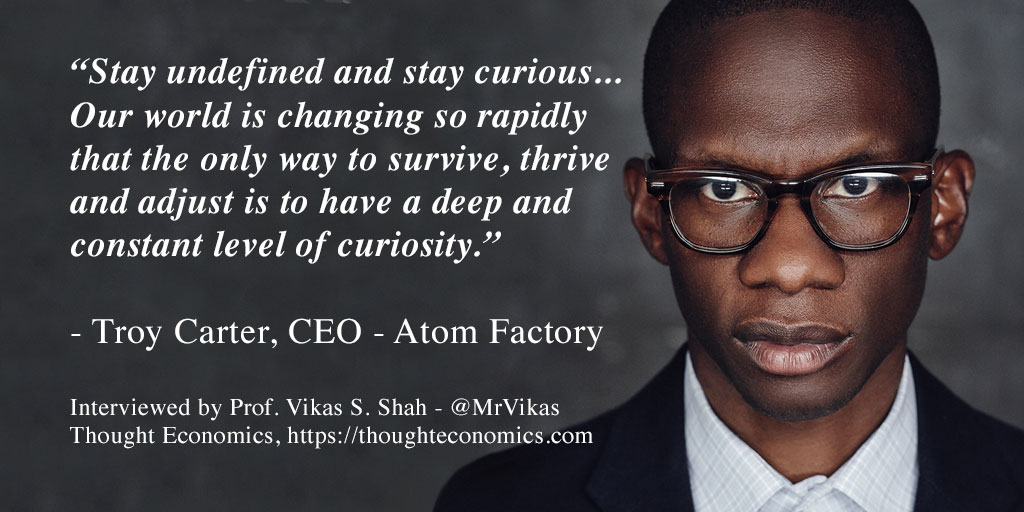
Fame is big business and multi-billion dollar industries spanning music, digital, film, television and technology are creating powerful celebrity and corporate brands that become deeply entwined with our lives.
Previously, it may have taken decades for a brand or individual to become household name, but in the hyper-media world, culture is being disrupted on a near-constant basis by superstar brands, individuals and movements.
Disruption is not accidental, and behind every success story is a leadership team who have carefully crafted every single element of that organisation or individual to resonate and amplify the zeitgeist. Troy Carter is one of these leaders, he’s the strategist and manager behind household names like Lady Gaga, John Legend, Meghan Trainor and Miguel; and is also a serial-entrepreneur and investor with holdings in companies including Spotify, Warby Parker, Songza, Dropbox, Fab and Uber.
Troy is the Chairman and CEO of Atom Factory, a pioneering entertainment and music management company, and I caught up with him to learn more about success in music and technology and how you build brands that disrupt cultures.
Q: How do you identify talent?
[Troy Carter] Everybody has some sort of talent… and while some people may do things at a higher level than others…. Everybody in the world has some fundamental qualities and talents they can bring to the table. When you’re identifying talent in music or other industries- one of the most important things to identify is which of those individuals is able to marry talent with extraordinary drive.
Q: How do you turn talent into cultural phenomena?
[Troy Carter] The artist must be willing to put in huge amounts of work. Being a superstar involves a lot of sacrifice, hard-work, long-hours and getting doors slammed in your face. You have to have the personality type and the wherewithal to make it through those tough times. If you get past that- the next step is to develop bespoke strategies based around that person’s specific goals and the market they want to go after.
I don’t believe in a one-size-fits-all approach for talent, you have to approach every individual and opportunity from a bespoke perspective.
Q: How do you identify investment opportunities in business?
[Troy Carter] I credit the success of any of my investments 100% to the founders of those businesses. With artists, the work is often more hands on- where I’ll be working as their chief strategy officer and manager, but I work with early-stage technology companies- we’re investing in great founders we believe in, they do the work. We can help on execution of course (if they need it) but for the most part we (as investors) are looking for brilliant people who are running their own companies, where we just invest capital, resources and relationships.
Q: How do you disrupt culture?
[Troy Carter] I’m always searching for that black-swan, what is that project, or who is that artist that feels specials, and feels counter-culture. Who is that artist that feels interesting and has a bold, unapologetic point of view? That’s what pulls me in- and you know what, if you find that and put the right strategy around it? You can disrupt culture.
Q: What is the role of mentoring and networks to success?
[Troy Carter] Mentorship and networks play a huge role in success.
I’ve been in the music industry since I was 16 years old, and in that time I’ve built a lot of relationships, been through many cycles, and the beauty of working with talent and global celebrity is that you deal with everything from consumer goods to fashion, politics, media, sports and more- it goes across the gamut!
When I’ve met a lot of early stage technology founders who were looking for business development relationships for example, these contacts allowed me to make the right matches and help those founders scale fast.
Q: What are your views on diversity in entrepreneurship?
[Troy Carter] I don’t think there are diversity issues in entrepreneurship in the wide sense, but rather we do have diversity issues in specific fields such as technology. We have a responsibility to do something about this, and while companies are starting to step-up, a lot more can still be done.
As a fund, we’re putting a lot of proactive strategies in place to encourage diversity through our portfolio- and we’re also seeing a lot more serious investors and funds around us do the same.
Q: What does entrepreneurship mean to you?
[Troy Carter] Entrepreneurship is a way of life.
For me, entrepreneurship has always been about being a builder. Whether it’s about undiscovered artists or working with companies pre-launch, the build process is what attracts me.
Look at the way our communities and countries have been built; a lot of it is just a bunch of entrepreneurs who have had great ideas.
Entrepreneurship is- I think- part of the core of who I am.
Q: What would be your message to the next generation of entrepreneurs?
[Troy Carter] Stay undefined and stay curious.
Our world is changing so rapidly that the only way to survive, thrive and adjust is to have a deep and constant level of curiosity.